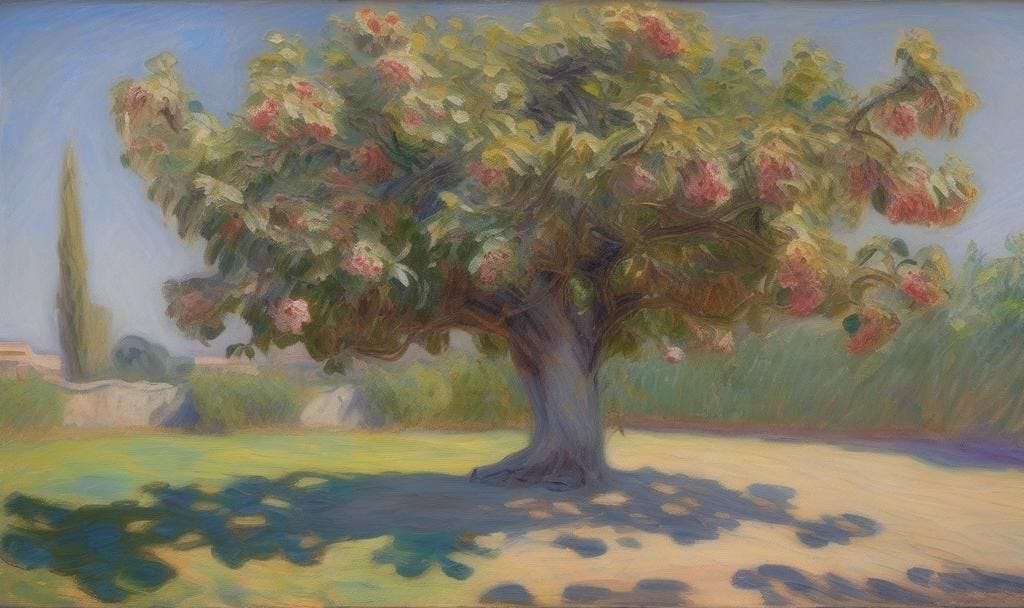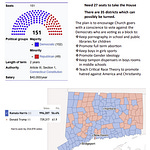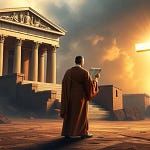
Advent 1
Jeremiah 33:14-16; Psalm 25:1-10; 1 Thessalonians 3:9-13; Luke 21:25-36
You can also subscribe to this podcast on Apple, Spotify, or YouTube.
I.
Atheists and unbelievers use Luke 21:32 to disprove Christianity.
They say that Jesus could not be the Messiah (and God) because this verse clearly shows that He was mistaken about future events.
Let me read it to you again. “Truly, I say to you, this generation will not pass away till all has taken place.”
Now, what is the “all” that is to take place to which Jesus is referring?
The “all” are the events referred to in the earlier verses of today’s reading.
Luke 21:25-27:
And there will be signs in sun and moon and stars, and upon the earth distress of nations in perplexity at the roaring of the sea and the waves, men fainting with fear and with foreboding of what is coming on the world; for the powers of the heavens will be shaken. And then they will see the Son of man coming in a cloud with power and great glory.
There are at least three ways these verses have been interpreted.
First, as a yet- (and still-) to-be-fulfilled prophecy of the end of the world.
Then they will trot out verse 32 and say:
We are now over 2,000 years since Jesus said these words and He still hasn’t returned.
Moreover, that generation to whom He spoke has certainly passed away. Christians are fools for believing that Jesus is God because God (who is supposedly all-knowing and knows the future) wouldn’t get this wrong.
A second, more charitable interpretation would say that this verse doesn’t necessarily discredit Jesus, but merely reflects Luke’s Jesus, and the expectation of the community to whom Luke wrote his Gospel that Jesus would return within their lifetimes.
Those who want to discredit Jesus’ and the Bible’s claim that He is God incarnate (and the Messiah promised to the Jews) point to this passage and say, “See? The world hasn’t ended. Jesus hasn’t returned on a cloud.”
These interpreters will then proceed to chart out the course of early church history as a coming-to-terms with the disappointment of this delayed return of Christ, this delayed Second Coming.
Over the centuries, many sects and cults claiming to know the day and hour of Jesus’ return have arisen, only to face this same disappointment when Jesus failed to return.
Both of these interpretations assume failure of some kind: either the failure of Jesus to correctly predict the future, casting doubt on His divinity, or of a failure by the apostles and authors of the New Testament to understand what Jesus meant.
Both interpretations, if true, would be damning to the credibility of the Christian faith and the Bible on which our faith is based.
That is why I prefer a third interpretation, one that does not make a liar of Jesus or a fool out of Luke.
You will recall that I preached last week that sound biblical interpretation must proceed according to the law of non-contradiction.
One passage of scripture must not be interpreted in such a way that it is repugnant to, or contradicts, another passage.
And so, it is difficult to say that the events of vv. 25-27 take place in the future, when Jesus says in verse 32 that they will take place during the lifetime of those to whom those words were written.
We must allow verse 32 to be the key that turns the lock of the entire passage to open up its meaning, both then and now, as we begin this season of Advent.
II.
Both Jeremiah and Luke are talking about the coming of Messiah.
The key point that Jeremiah is making is that the Messiah will be the righteousness of His people.
The words righteous and righteousness can mean several things in Hebrew: everything from justice to prosperity, victory, virtue, and salvation.
You will notice in Jeremiah 33:15, it says that the Messiah “shall execute justice and righteousness in the land.”
Righteousness is something that is applied by the Messiah to His people.
In other words — and this is a big hurdle for a lot of us to get over — we are not trying to solve for justice, prosperity, victory, or virtue.
We are not trying to figure out how to accomplish these things on our own.
Rather, they are executed on our behalf.
This is why Jeremiah says that in those days people will say, “The Lord is our righteousness.”
You’ve heard people say, “You make your own luck” or “I did it my way.”
Where does that get you?
I’ve heard hell described as the place where everyone does it his way, or her way.
Hell is a place where there is no community because everyone is exactly equal.
Have you ever thought about it that way?
Community is actually predicated on everyone not having everything he or she needs.
Community happens when people come together to supply what is lacking in themselves, to barter, exchange, or simply to give away what they have that someone else doesn’t have.
Well, the righteousness that the Messiah brings is the opposite of the “you make your own luck” or “my way” sentiment.
Christ is the good fortune of His people. He not only shows them the way, but He becomes their way.
He supplies what they are lacking.
In this case, what they are lacking is righteousness.
Jesus echoes this in John 3:16 when He says, “I am the way, and the truth, and the life.”
Now, if Jeremiah is saying that the Messiah is the righteousness of His people, Luke seems to be saying the same thing in reverse: that the Messiah’s people must be righteous.
Luke 21:34 says, “But take heed to yourselves lest your hearts be weighed down with dissipation and drunkenness and cares of this life.”
And verse 36 is a warning to Jesus’ followers to “watch at all times, praying that you may have strength to escape all these things that will take place, and to stand before the Son of man.”
Both of these verses seem to put the burden on us to be ready and worthy of the Messiah when He comes.
So, which is it? Is the Messiah coming to save us, or do we have to make ourselves worthy of being saved?
As with all of these conundrums, we must work to resolve this apparent contradiction.
Fortunately, Jesus tells us a little parable in Luke 21:20-31, that will help us untie this knot.
And he told them a parable: “Look at the fig tree, and all the trees; as soon as they come out in leaf, you see for yourselves and know that the summer is already near. So also, when you see these things taking place, you know that the kingdom of God is near.
The other day I was driving along a country road, and it had been several weeks since I last drove it.
When I drove on the road last, it was still late fall. Most trees had lost their leaves, but there was still a fair amount of color left.
This time, I noticed how barren and brown everything had become.
“It is winter,” I said to myself, though the calendar says there are still 21 days until winter starts.
But then I drove around a bend and saw a cluster of trees that still had their leaves and were bright yellow.
I remembered that these trees had still been green a few weeks ago, even though it was already November.
There was something out of season about these trees.
Winter had clearly come. All the other trees said so. These trees were holding out.
Jesus has a thing for trees and out-of-season fig trees in particular.
In Mark 11:12-14, Jesus cursed a fig tree for not having any figs on it, even though Mark is explicit that it was not the season for figs.
And seeing in the distance a fig tree in leaf, he went to see if he could find anything on it. When he came to it, he found nothing but leaves, for it was not the season for figs. And he said to it, “May no one ever eat fruit from you again.” And his disciples heard it.
The point is: when the Messiah finally comes, then it is time for all trees to bear fruit, regardless of what the calendar says!
In other words, when the Messiah comes, it is time for the righteous to be what they are, righteous, and for the cursed to be what they are, cursed.
The text isn’t really saying anything more than that.
Jesus comes to reveal us to ourselves and in what state of bloom (or blight, as the case may be) we actually are.
Are we those who have always known in our hearts that we need to look to God for truth, or have we sought truth apart from God?
Jesus says in Matthew 7:16, “You will know them by their fruits.”
If we have sought the truth in God, then the coming of Christ will vindicate us, revealing to the world what we’ve always known by faith: that, as Christians, we have a firm grasp on something permanent, a righteousness grounded in Christ.
And so, what we have to do is put our temporal concerns in perspective and remember that we belong to an eternal kingdom.
III.
Let’s go back to the first problem: if these verses from Luke describe the past, then what use are they today?
But before we do that, I need to explain why I think these verses describe past events, a prophecy that has already been fulfilled.
First, Luke 21:32 says, “Truly, I say to you, this generation will not pass away till all has taken place.”
One thing it is impossible for God to do is lie.
If Jesus is wrong here, then let us have nothing more to do with Him.
Incidentally, this very verse is evidence that the Bible has recorded the event accurately.
If Luke or later editors were involved in some conspiracy to deify Christ after the fact, to make Jesus out to be better than He was, then surely, they would have edited out this troublesome verse.
The fact that this verse is included in the gospel and the authority of the one speaking these words lead me to believe that what Jesus described did take place.
Second, the text is about judgment, and the generation in question did indeed pass away into history, and largely under judgment.
Compare the temple to the fig tree, which Jesus cursed immediately after visiting the temple (Mark 11:11-14).
The next day, He visits the temple again, only to find money changers fleecing the people, whom He promptly turned out.
Within a generation — the same generation we are talking about in Luke 21:32 — that temple — along with the entire city of Jerusalem — lay in ruins, besieged and destroyed by the Roman Army.
Surely, this was a tree that would never bear fruit again.
So, I’ve made my case briefly that Jesus’ words are about the future for His immediate audience but describe the past when we read them today.
But does that mean that we don’t face judgement today? Surely not.
The fig tree is cursed because it is not fruitful when the harvest season finally arrives.
Harvest comes when the Lord of the harvest decides it is time to cull the fields, not when the calendar tells Him to.
Jerusalem, that city which is always killing the prophets, always stoning those who are sent to warn her, is not in season when Jesus comes to visit (Matthew 23:37).
The city’s lack of readiness — which is to say its lack of righteousness — when Jesus comes, seals the city’s fate.
Jerusalem’s doom is certain, and that generation did not pass away until all had taken place.
That generation lacked anything permanent to hang on to when the judgment finally came.
IV.
We, however, have something permanent.
Luke 21:28 says, “Now when these things begin to take place, look up and raise your heads, because your redemption is drawing near.”
And Luke 21:36 says that if we pray, we will receive “…strength to escape all these things that will take place, and to stand before the Son of man.”
Redemption and strength to stand, neither of which are ephemeral, both of which are permanent — we are not raised from sin to stand before the Son of man only to fall back into sin — these things are permanent because they come from God.
In 1 Thessalonians 3:13, Paul prays that Jesus, “may establish your hearts unblamable in holiness before our God and Father, at the coming of our Lord Jesus with all his saints.”
Do you see how Paul expects Jesus to be doing the establishing but also to be bringing the holiness?
Where the Messiah is, there is righteousness.
Jesus shows us who we are and what our true condition is: either in bloom or under blight.
V.
Let me try to tie up the threads of this sermon and give you some takeaways.
These are tough passages, given to many interpretations.
Not everyone will agree with mine, that the events described in Luke have already taken place.
I’ve warned you against the kind of catastrophic, world-is-going-to-end reading that can sometimes breed optimism and hope for a quick fix to personal and larger societal problems.
This inevitably leads to disappointment when the promised Messiah fails to return, or, at least, fails to return in the way you expect or want Him to return.
I’ve argued that we should read these passages as prophecies that have largely been fulfilled already and that during the season of Advent, we get to look back to a wonderful event that has taken place.
Jesus Christ has come! That is good news. That is gospel.
That means that righteousness is here, in our midst, even within us.
Justice, virtue (that is to say making a habit of living well), victory, and salvation, are not only possible, but they become real when we start to live as God would have us live, that is, to live according to His law.
Jesus shows us who we are.
We are either with Him, which means He executes justice on our behalf, or we are against Him, which means He executes justice against us.
Since, as I preached last week, Christ is a human king, alive and well, sitting on the throne of the universe, we should expect His judgments to be executed constantly, both in our personal lives and in our civic and national lives.
In this way, Jesus not only reveals who we are as individuals and whose side we’re on, He also reveals who entire peoples and nations are, and whose side they are on.
This is why our Pilgrim and Puritan forefathers made such a big deal about national apostasy and national repentance (national thanksgiving too, which we’ve just celebrated).
The key thing I would have you remember is that Christ’s coming, His first advent, reinforces the point I made last week: we belong to an eternal kingdom, one that will not pass away.
This is because righteousness, justice, virtue, salvation, and victory are not, and will never come, under judgment.
As St. Paul says, against the fruit of the Spirit there is no law (Galatians 5:22-23).
But all that is contrary to God’s Holy Spirit is under judgment and will eventually be destroyed.
I say eventually be destroyed, because though I’ve argued that Jesus was correct, and that His prophecy was fulfilled in the generation that first heard it, it remains unfulfilled for we who still hear it, and who still face the possibility of judgment.
Luke 21:33, “Heaven and earth will pass away, but my words will not pass away.”
That is because truth lasts forever, whereas lies die with those who tell them.
The good news is that there is still time to escape this destruction. That is a warning that many in the generation to whom Jesus originally spoke did not take seriously.
Let us not be like them.
Instead, let us be like those who raised their head, because they knew their redemption was drawing near. Let us be like those who are found worthy to stand before the Son of Man.
Let us pray:
Almighty God, give us grace that we may cast away the works of darkness, and put upon us the armor of light, now in the time of this mortal life in which thy Son Jesus Christ came to visit us in great humility; that in the last day, when he shall come again in his glorious majesty to judge both the quick and the dead, we may rise to the life immortal; through him who liveth and reigneth with thee and the Holy Ghost, one God, now and for ever. Amen.
Preached on December 1, 2024 at the First Congregational Church, Woodbury, Connecticut.
Questions for reflection and discussion:
Atheists and unbelievers use Luke 21:32 to ____________ Christianity.
Some historians describe early church history as a coming-to-terms with the ____________ of the delayed return of Christ.
Explain why it is difficult to say that the events of vv. 25-27 take place in the future
The words righteous and righteousness can mean several things in Hebrew: everything from justice to prosperity, victory, virtue, and ____________.
Righteousness is something that is ____________ by the Messiah to His people.
Hell can be called a place where there is no ____________.
The righteousness that the Messiah brings is the ____________ of the “you make your own luck” or “my way” sentiment.
The fig tree is cursed because it is not ____________ when the harvest season arrives.
Where the ____________ is, there is righteousness.
These are tough passages, given to many ____________.
Pastor Jake argues that we should read these passages as prophecies that have largely been ____________.
Christ’s coming, His advent, reinforces the point Pastor made last week: we belong to an ____________ kingdom, one that will not pass away.
Parents and Grandparents, you are responsible to apply God’s Word to your children’s lives. Here is some help. Young Children – draw a picture about something you hear during the sermon. Explain your picture(s) to your parents or the minister after church. Older Children – Discuss with your parents one or both of the following: 1) Describe something that you wanted to happen but didn’t. Describe your disappointment. 2) How do you feel about it now? Do you still really want it to happen? Or have you gotten over it? What does this tell you about what you want and don’t want?
(1) disprove; (2) disappointment; (3) because Jesus said they would take place during His hearer’s lifetimes; (4) salvation; (5) applied; (6) community; (7) opposite; (8) fruitful; (9) Messiah; (10) interpretations; (11) fulfilled; (12) eternal











